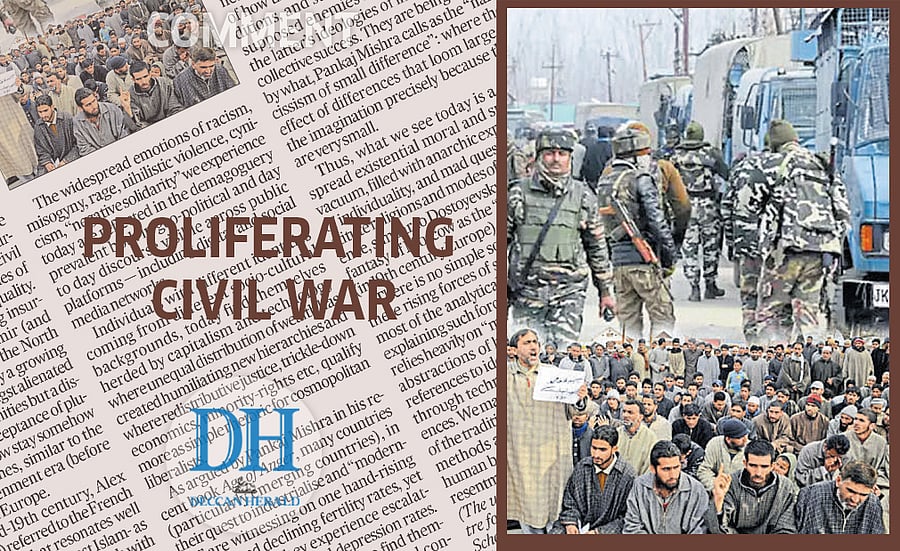The ambitious liberal philosophers of the enlightenment era brought forth the idea of a perfectible society - one whose quest for overall well-being remained rooted in liberal ideas of individualised rationality with the concept of 'free' trade and an alluring faith in markets, seen as self-equilibrating forces.
A reflection on the contemporary scene of the global socio-political landscape today highlights a gradual transcending away from these values under more heavy-handed, authoritarian states that consider it fair to give up constitutionally realised democratic, libertarian values in the hope of promising development for the majority.
In India's own case, from banning the consumption of beef, cutting meal portions to size to regulate eating habits of people, pushing for state-wide liquor prohibitions, creating moral policing squads affecting inter-personal relationships etc, the steps taken allure us to a radical transformation in the governing dynamics of state order and its reach.
Amidst dilution of plural value systems, a common global trend emerging out of such authoritarian actions of state (also evident in countries like USA, Turkey, France etc), is a proliferating civil war, under exacerbating insecurities of political, social and economic inequality.
The current situation of rising insurgency and militancy in Kashmir (and other parts of India including the North East region) indicate not only a growing feeling of resentment amongst alienated youth of different communities but a dissolution of faith in the acceptance of pluralistic identities that now stay somehow divided on religious lines, similar to the times of pre-enlightenment era (before late 18th century) in Europe.
Back in the mid-19th century, Alex Tocqueville (1840) referred to the French Revolution in a way that resonates well with today's global war against Islam- as a revolution that "flooded the earth with its soldiers, apostles and martyrs". The decades preceding the French revolution constituted as "one of the most religious periods of history", consecrated by "Pope Voltaire", a "fanatic of his religion of humanity". The religion that then took over Europe in the age of enlightenment, was erected with new absolutes of liberalism-"progress, humanity, the republic".
In India's own case, if conflict is viewed as a continuum, downward trends in violence do not necessarily imply that the risk of conflict has reduced. Whereas absolute numbers in Jammu and Kashmir (J&K), the North East and Naxal affected districts might be decreasing, they do not capture new forms of social unrest, ethnic violence and protests (that fall outside the classical definitions of insurgency).
In a world where the modern promise of equality collides with massive disparities of power, education, status and property ownership, the backlash and discontentment created by globalisation today, isn't a new phenomenon. Rather, we can see it as the product of an essentially cyclical, historically inevitable phenomenon.
The widespread emotions of racism, misogyny, rage, nihilistic violence, cynicism, "negative solidarity" we experience today are reflected in the demagoguery prevalent both in geo-political and day to day discourse visible across public platforms - including digital and social media networks.
Individuals with different identities coming from different socio-cultural backgrounds, today find themselves herded by capitalism and technology where unequal distribution of wealth has created humiliating new hierarchies and where redistributive justice, trickle-down economics, minority-rights etc, qualify more as simple rhetoric for cosmopolitan liberalists.
As argued by Pankaj Mishra in his recent book Age of Anger, many countries (particularly emerging countries), in their quest to industrialise and "modernise" are witnessing on one hand-rising literacy and declining fertility rates, yet on the other, they experience escalating crime, suicide and depression rates. These countries are likely to find themselves at political and emotional conjunctures similar to the history of the "modernised" world itself.
The idea of a modern nation-state today remains pillared on four broader attributes with the modern state as an institutional formation; modern social regulator; market-oriented (sub-divided into economic and political market) and civil society. Somehow the balance between these four pillars has been destroyed with a skewed focus on the market (particularly the economic market), where most state actions and policy considerations are formulated upon.
Internal backlash
One of the factors that may explain the emergence of an internal backlash in form of a civil war within rapidly "modernising" market-oriented states (like India) owes to negative social externalities created under radical majoritarian nationalist agendas pushed by such monolithic, homogeneous states.
Agendas that continue to abandon the social acceptance of plural identities in their very organic existential form, are now deserting them. In every human case and form of social order, identity always turns out to be porous, inconsistent rather than being fixed or discreet, often being prone to getting confused and lost in the play of mirrors.
Radical Islamists or Hindu nationalists may insist on their "cultural distinctiveness" and "moral superiority" because of how they have lost their religious traditions, and started to resemble their supposed enemies in their pursuit of the latter's ideologies of individual and collective success. They are being driven by what, Pankaj Mishra calls as the "narcissism of small difference": where the effect of differences that loom large in the imagination precisely because they are very small.
Thus, what we see today is a widespread existential moral and spiritual vacuum, filled with anarchic expressions of individuality, and mad quests for substitute religions and modes of transcendence, similar to Dostoyevsky's millennial fantasy of Moscow as the "Third Rome" (in 19th century Europe).
There is no simple solution to escape these rising forces of self-destruction as most of the analytical reasoning used in explaining such forces by social scientists relies heavily on "materialist" theoretical abstractions of homogeneously made references to identity, nation and capital through techniques of statistical inferences. We may do well to go beyond some of the traditional, mainstream analytical methods and consider the irreducible human being, her/his fears, desires and resentments as the unit of our analysis.
(The writer is Executive Director, Centre for New Economics Studies, Jindal School of International Affairs, O P Jindal Global University, Sonipat, Haryana)

